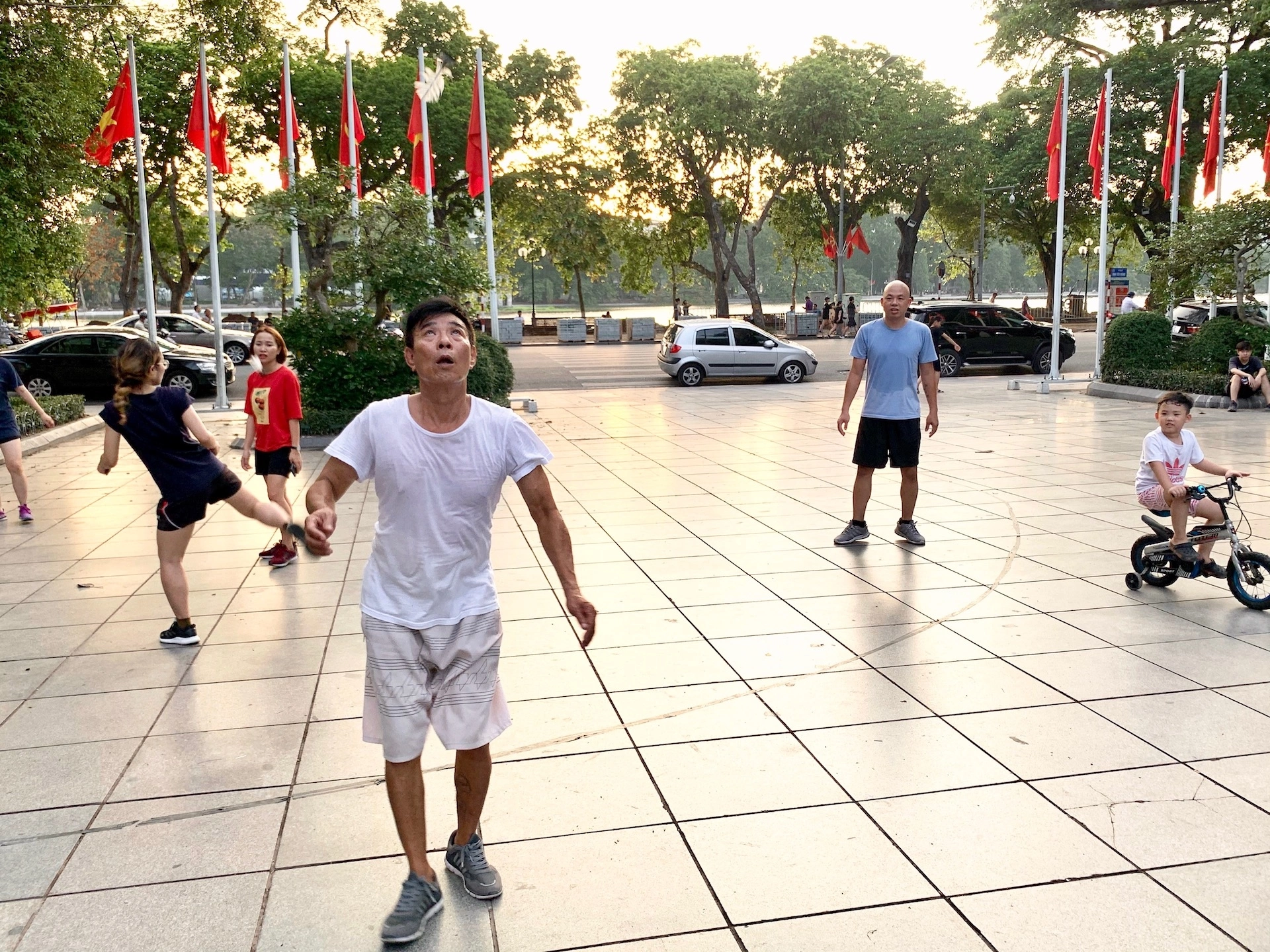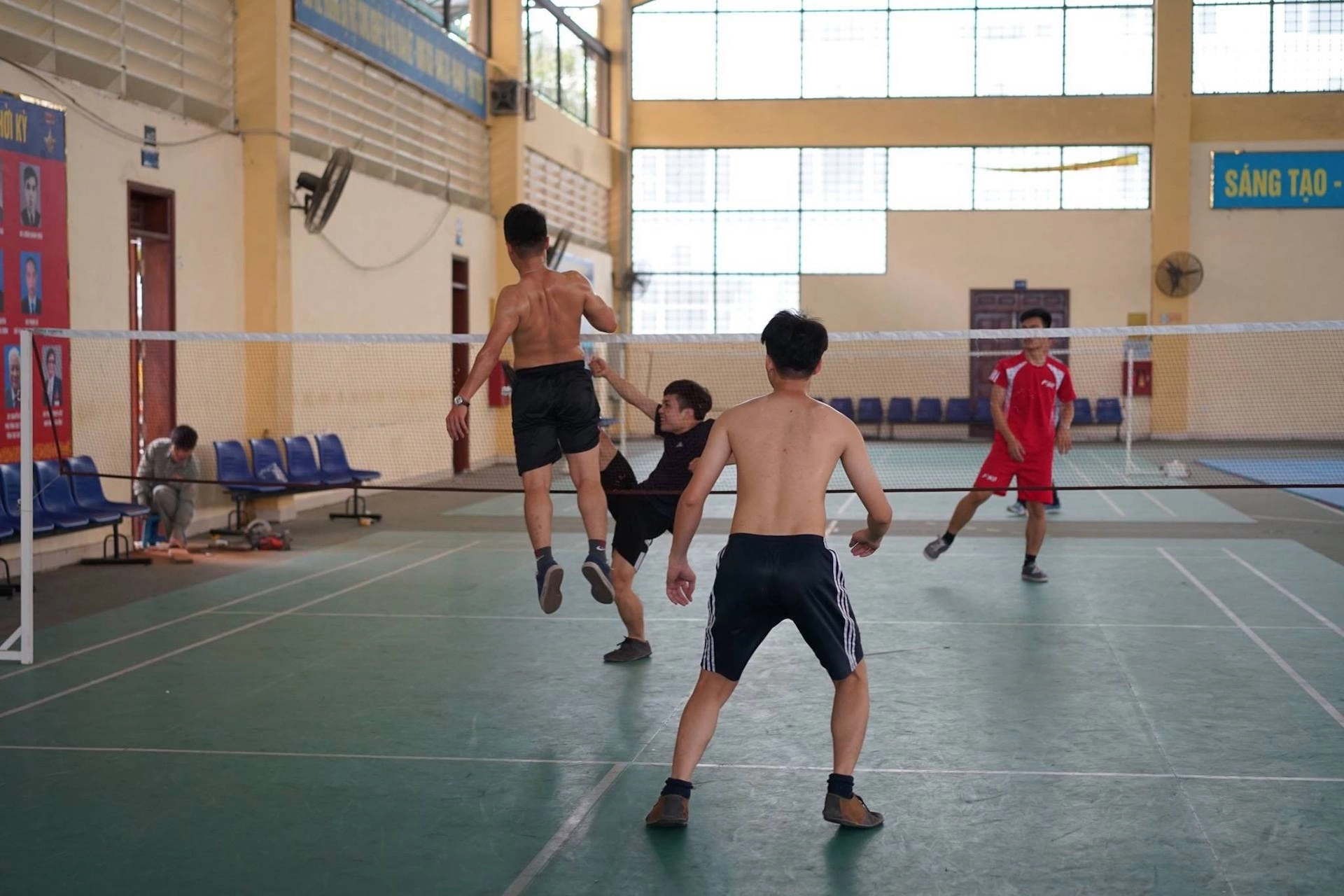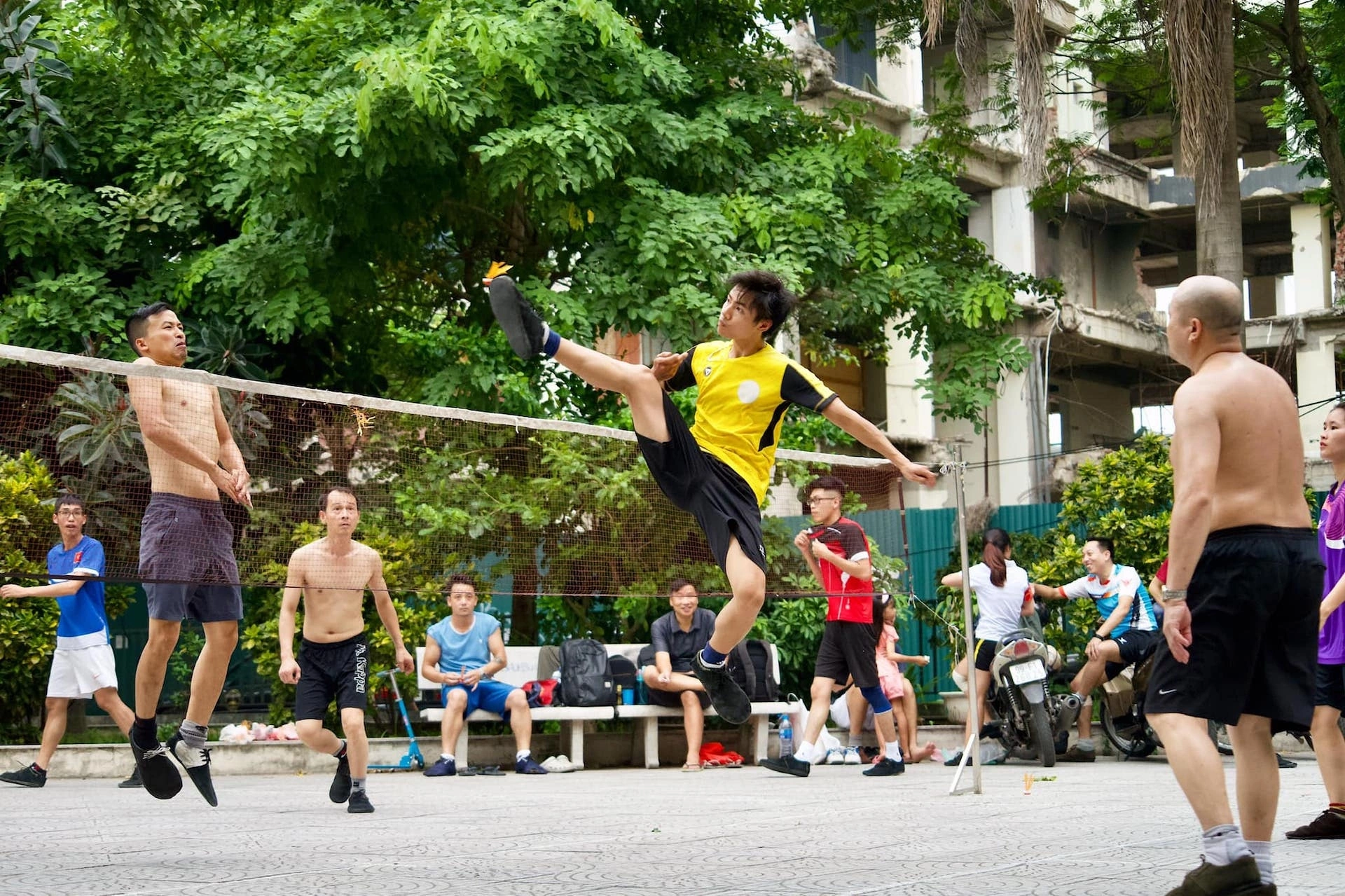There is a spring in his step as 16-year-old Pham Viet Giap walks to the Ly Thai To Garden on Hanoi’s Le Lai Street, opposite the iconic Hoan Kiem Lake.
A sunny afternoon is the best time to play his favorite sport – da cau; and all he requires to engage in it is a shuttlecock – an upright, colorful plastic feather or feathers weighted down by washers or coins with a hole in the center.
Giap said he comes to the garden to play da cau with some friends and his older sister every day after school. It has been like this for nearly a year now.
"This sport is very easy to
play. It only needs a shuttlecock and a few people standing in a circle. We
usually play from 5 p.m. until it gets dark. It’s really a good form of daily
exercise for me because I’m trying to lose some weight."

Da cau can be said to be the national street sport in Vietnam. It is also played in several other countries including China, where it originated as jianzi, but Vietnam has taken it to heights yet to be matched, as evidenced by its status as undisputed world champions for several years.
The game’s popularity in the country cuts across age and gender and it is the only one where septuagenarians and teens can be seen playing together with gusto.
On the streets in Hanoi and other cites at mid-afternoon before sunset is perhaps the peak time for this sport. Many groups of all ages can be seen playing it in local parks, gardens, pavements, neighborhood yards and so on. The most ardent also play this game early in the morning and they are a regular feature among the hordes that walk, jog, exercise and dance as dawn breaks over the cities.
The rule and goal of this game is very simple – keep the shuttlecock in the air for as long as possible, passing it between those playing it in order or at random, using every part of the body except the arms and hands.
According to the International Shuttlecock Federation (ISF), da cau is the national sport of Vietnam going as far back as the 11th century. Wood carvings of the foot shuttlecock players have been found in some 17th century Vietnamese temples.
Shuttlecock was neglected in Vietnam during the 1950s, ‘60s and ‘70s, when the nation was fighting France and the U.S. After the Vietnam War ended in 1975, a well-known Hanoi pediatrician, Dr. Nguyen Khac Vien, campaigned to revive the sport.
Recognizing games as a universal need, especially among children, he organized teams of players and facilitated the production of inexpensive shuttlecocks, the ISF notes on its website.

The various ways in which a shuttlecock was fashioned in order to play the game generate stories of their own.
Vo Manh Hung, 55, said: "When I was a kid, my family couldn’t afford to buy a shuttlecock, so I made one myself. I would find rubber in old boots or tires to make the hitting disc part, then get some old coins for the base. For the feather, I went to the farm and picked some that had fallen from chickens and ducks.
"It was not pretty or high quality as the ones bought in a shop, but for me, it was enough."

There are two ways to play da cau: casual and competitive. In the casual version a net is not needed. People usually stand in a circle and kick the shuttlecock around, displaying acrobatic skills and creativity that draws applause from fellow players and bystanders. There is no scoring system. Whoever gets the most consecutive kicks before the shuttlecock drops on the floor gets thumbs up from others.
Street competitions
The competitive version of the game has a court and a net, with rules similar to badminton. In many of Hanoi’s parks and public gardens, nets are installed for both da cau and badminton players. Street competitions take place typically between highly experienced and skilled players. These people treat da cau seriously even as they enjoy it as a hobby.
Competitively, da cau is played on a rectangular court 6.1 meters wide and 11.88 meters long, divided by a net at a height of 1.6 meters for men and 1.5 meters for women. The width of a boundary line is 4 cm. A standard da cau shuttlecock weighs 13 to 15 grams and is 13 to 15 cm long.
The winning team or individual is the one that first wins two sets. In case of a draw (1-1), a determining third set is played.
A set is won by reaching 21 points first with a minimum two-point advantage. In case the score reads 20-20, the game is continued until the two-point advantage is achieved (23-21, 24-22...). A point is scored when the shuttlecock lands on the court floor of the opponent. If a match goes to the third and deciding set, the teams change sides at the 11-point-mark.

Da cau matches can be played as singles, doubles, team (three players each side) and mixed doubles or team.
Many street competitions are held every year, especially in Hanoi. Amateur teams who contest these form a strong, closely-knit community of enthusiasts.
Dinh Khue, 26, said: "I have been playing da cau for many years and have participated in a lot of competitions in Hanoi, although I’m not in any team. The community is really amazing and supportive. I have made many friends by joining these amateur tournaments."
Another amateur competitor, Dang Son Tung, 21, said: "Da cau is a vigorous activity that can make me more healthy and flexible. It requires high focus and quick reflexes. At the end of the day, for me, it’s about exercising for better health, both physical and mental."

Numero Uno
On the world stage, Vietnam is king of this sport. Through 10 editions of the World Shuttlecock Championships (WSC), Vietnam has proved it is the powerhouse, going undefeated and finishing first in all tournaments since the first one in 1999.
At the 2019 WSC hosted in France, Vietnam once again showed its prowess, topping the tournament with five gold and two silver medals.
Vietnam’s national shuttlecock team is chosen through the annual national championship, which attracts the participation of the best players from all localities in the country.
However, to everyone’s surprise, Vietnam will exclude da cau from the SEA Games 31 it will host next year. No reason has been given for this decision, which has surprised everyone because the sport has been a consistent, trusted title winner for the country.
"With da cau removed from SEA Games next year, it will be a huge loss for Vietnam because we are the top country in this sport. Easy gold medals right there," said Pham The Hoang, a member of the Buon Ma Thuot Shuttlecock Club.
Apart from the WSC or SEA Games, da cau has not been added into bigger sports events like the Asian Games or the Olympics.

Da cau lovers, therefore, have reason to hope for greater prominence for the game in the future.
Hoang said: "With its popularity rising worldwide, I hope it can get a spot at the Olympics in the near future and make everyone fall in love with it, just like us Vietnamese.
But even if it doesn’t happen, it’s totally fine
because people in Vietnam will keep embracing and enjoying this beautiful game."
Hoang Nguyen